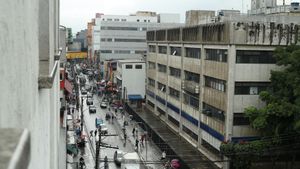The political scene is heating up as Germany gears up for the 2025 Federal Election, scheduled for February 23rd. With millions of voters poised to decide the future of the nation, parties are intensifying their campaigns amid growing public discourse on various issues.
Among the latest developments is the launch of the Wahl-O-Mat, a tool created to assist voters in matching their preferences with party platforms. Designed to navigate the complex political environment, the Wahl-O-Mat allows users to compare their views on significant political issues like security, migration, energy, and economic policies against the positions laid out by different political parties.
The Wahl-O-Mat will go live shortly, offering voters valuable insights without necessarily giving explicit recommendations on whom to vote for. It is based on 38 statements derived from the parties' official manifesto documents, compiled by a team of political scientists, statisticians, and young voters aged 18 to 26. This collaboration aims to reflect contemporary political challenges and the expectations of the electorate.
Reported by RTL, this year's election preparations were accelerated following the abrupt collapse of the previous coalition government, known as the Ampel coalition. The deadline for launching the Wahl-O-Mat came under tight constraints, requiring the team to operate quickly within just 10 to 14 weeks—a timeframe they usually have for such comprehensive projects.
On the campaign trail, the main figures are vying for the electorate's attention as they deliver their party messages. Leading figures such as Olaf Scholz from the Social Democratic Party (SPD), Friedrich Merz from the Christian Democrats (CDU), and other notable candidates will participate in high-profile debates leading up to the election. These debates will be pivotal as they not only provide visibility to candidates but also allow voters to gauge where the parties stand on pressing issues.
On the same note, der Wahlkampf zur Bundestagswahl 2025 has intensified, with various polling results hinting at changing dynamics. Campaigns are actively engaging with potential voters, including campaigns focused on personal outreach, urging supporters to call acquaintances and family members to discuss the importance of voting.
These outreach efforts reflect the urgency of electoral participation, especially considering the political stakes involved. The upcoming election is viewed as transformative, with results likely affecting Germany's stance on domestic and international issues for years to come.
How have previous elections shaped the current political climate? The answer lies in the inter-party dynamics and how voter preferences will tilt as campaigning progresses. Within this fast-evolving atmosphere, the upcoming debates and tools like the Wahl-O-Mat will play major roles in empowering voter decision-making.
Analysts are particularly interested to see how the opposition parties, alongside campaign performances of established leaders, will influence voter sentiment. With reactions to political issues varying widely among the electorate, effective communication strategies will be key to appealing to the undecided and swing voters.
The utilization of technology, such as the Wahl-O-Mat, symbolizes efforts to modernize the electoral process and combat growing political disillusionment. By making party platforms more accessible, the goal is to motivate younger voters and those unfamiliar with traditional campaigning to engage with politics.
Major media outlets, including RTL, are expected to broadcast updates as election day approaches. These platforms will provide insights on poll movements, party strategies, and any shifts leading up to the pivotal date.
Through the diverse initiatives planned prior to February 23rd, the aim is to create not only awareness but also excitement about democratic involvement among citizens across Germany. The election will test the resilience of party coalitions, the effectiveness of engagement tools like the Wahl-O-Mat, and the ability of candidates to resonate with the needs of modern voters. It is pivotal for the effective functioning of democracy, maintaining informed citizenry, and ensuring various political voices are heard as the electoral showdown nears.
Indeed, as the countdown to the election begins, all eyes will be on the campaign strategies, voter turnout initiatives, and whether the Wahl-O-Mat will significantly impact voter decisions, possibly reshaping the political future of Germany depending on its reception among the electorate.



